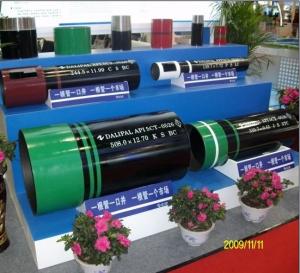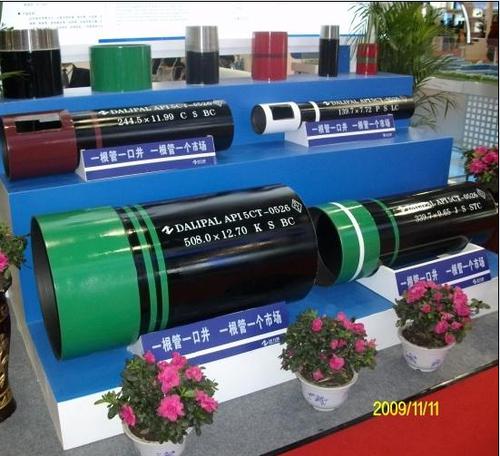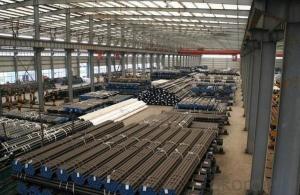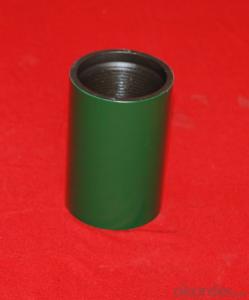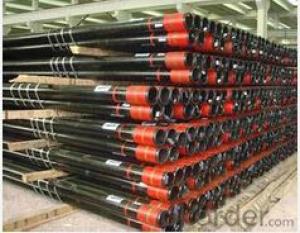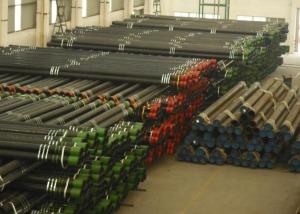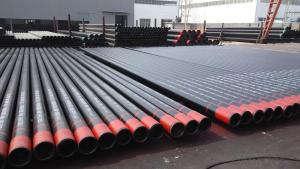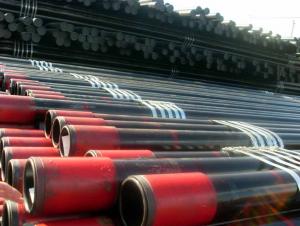A P I 5CT Oil Well Tubing
- Loading Port:
- Tianjin
- Payment Terms:
- TT OR LC
- Min Order Qty:
- -
- Supply Capability:
- 20000ton m.t./month
OKorder Service Pledge
OKorder Financial Service
You Might Also Like
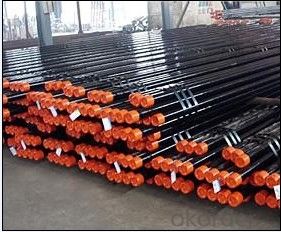
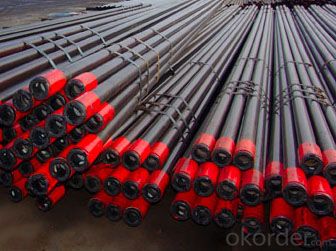
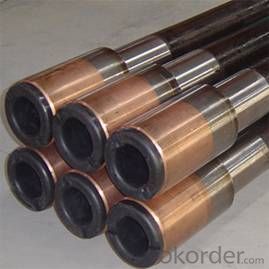
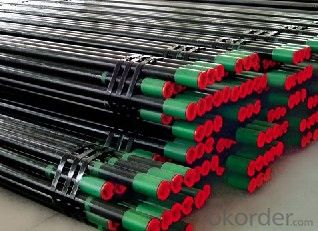
API 5CT OIL WELL TUBEING
Size:
O.D. 1 1/2", 2-3/8", 2-7/8", 3-1/2",4", 4-1/2"
Grade: J55, N80, L80, C90, T95, P110
Wall thickness: 3.18 - 10.54mm
Thread: 8RD and 10RD
Length:
R1-(6.10m~7.32m),R2-(7.62/8.53)~10.36m,R3-(10.36/10.97~14.63m)
Certificate:
API 5CT,Russian Certificate,ISO,CCS
Packing:
Coating and steel thread protector
A P I 5CT Oil Well Tubing Size
| size (in) | NUE OD | NUE ID | EUE OD | EUE ID | NUE COUPLING | EUE COUPLING |
1 1/2 | 48.3 | 40.3 | 53.2 | 40.3 | 55 | 63.5 |
2 3/8 | 60.3 | 50.3 | 65.9 | 50.3 | 73 | 78 |
2 7/8 | 73.0 | 62.0 | 78.6 | 62.0 | 89.5 | 93 |
3 1/2 | 88.9 | 75.9 | 95.25 | 75.9 | 107 | 114.5 |
4 | 101.6 | 88.6 | 107.95 | 88.6 | 121 | 127 |
| 4 1/2 | 114.3 | 100.3 | 120.65 | 100.3 | 132.5 | 141.5 |
Remarked: EUE---External Upset End EUP---External Upset Pin EUB---External Upset Box | ||||||
| Size Desination | Weight Desination | Outside Diameter | Wall Thickness | Type of End Finish | ||||||||
| Grade | ||||||||||||
| T&C Non-Upset | T&C External Upset | in | mm | in | mm | J55 K55 | L80 | N80 | C90 | T95 | P110 | |
| 1.900 | 2.40 | - | 1.900 | 48.26 | 0.125 | 3.18 | PI | - | - | - | - | - |
| 2.75 | 2.90 | 0.145 | 3.68 | PNUI | PNUI | PNUI | PNUI | PNUI | - | |||
| 3.65 | 3.73 | 0.200 | 5.08 | PU | PU | PU | PU | PU | PU | |||
| 4.42 | - | 0.250 | 6.35 | - | P | - | P | P | - | |||
| 5.15 | - | 0.300 | 7.62 | - | P | - | P | P | - | |||
| 2 3/8 | 4.00 | - | 2.375 | 60.3 | 0.167 | 4.24 | PN | PN | PN | PN | PN | - |
| 4.00 | 4.70 | 0.190 | 4.83 | PNU | PNU | PNU | PNU | PNU | PNU | |||
| 5.80 | 5.95 | 0.254 | 6.45 | - | PNU | PNU | PNU | PNU | PNU | |||
| 6.60 | - | 0.259 | 7.49 | P | P | P | P | P | - | |||
| 7.35 | 7.45 | 0.336 | 8.53 | PU | PU | PU | PU | PU | - | |||
| 2 7/8 | 6.40 | 6.50 | 2.875 | 73.02 | 0.217 | 5.51 | PNU | PNU | PNU | PNU | PNU | PNU |
| 7.80 | 7.90 | 0.276 | 7.01 | - | PNU | PNU | PNU | PNU | PNU | |||
| 8.60 | 8.70 | 0.308 | 7.82 | - | PNU | PNU | PNU | PNU | PNU | |||
| 9.35 | 9.45 | 0.340 | 8.64 | - | PU | - | PU | PU | - | |||
| 10.50 | - | 0.392 | 9.96 | - | P | - | P | P | - | |||
| 11.50 | - | 0.440 | 11.18 | - | P | - | P | P | - | |||
| 3 1/2 | 7.70 | - | 3.500 | 88.9 | 0.216 | 5.49 | PN | PN | PN | PN | PN | - |
| 9.20 | 9.30 | 0.254 | 6.45 | PUN | PUN | PUN | PNU | PNU | PUN | |||
| 10.20 | - | 0.289 | 7.34 | PN | PN | PN | PN | PN | - | |||
| 12.70 | 12.95 | 0.375 | 9.53 | - | PUN | PUN | PNU | PNU | PUN | |||
| 14.30 | - | 0.430 | 10.92 | - | P | - | P | P | - | |||
| 15.50 | - | 0.476 | 12.00 | - | P | - | P | P | - | |||
| 17.00 | - | 0.530 | 13.46 | - | P | - | P | P | - | |||
| 4 | 9.50 | - | 4.00 | 101.6 | 0.226 | 5.74 | PN | PN | PN | PN | PN | PN |
10.70 | 11.00 | 0.262 | 6.65 | PU | PU | PU | PU | PU | PU | |||
| 4 1/2 | 12.60 | 12.75 | 4.500 | 114.3 | 0.271 | 6.88 | PNU | PNU | PNU | PNU | PNU | - |
| 15.20 | - | 0.337 | 8.56 | - | P | - | P | P | - | |||
| 17.00 | - | 0.380 | 9.65 | - | P | - | P | P | - | |||
| 18.90 | - | 0.430 | 10.92 | - | P | - | P | P | - | |||
| 21.50 | - | 0.500 | 12.70 | - | P | - | P | P | - | |||
| 23.70 | - | 0.560 | 14.22 | - | P | - | P | P | - | |||
| 26.10 | - | 0.630 | 16.00 | - | P | - | P | P | - | |||
Dalipal Company is one of the most famous enterprises of china professionally producing pipeline and oil casing.We can supply API 5CT series of pipeline and oil casing with all kinds of specifications and materials.We have first-class production equipment and technology.
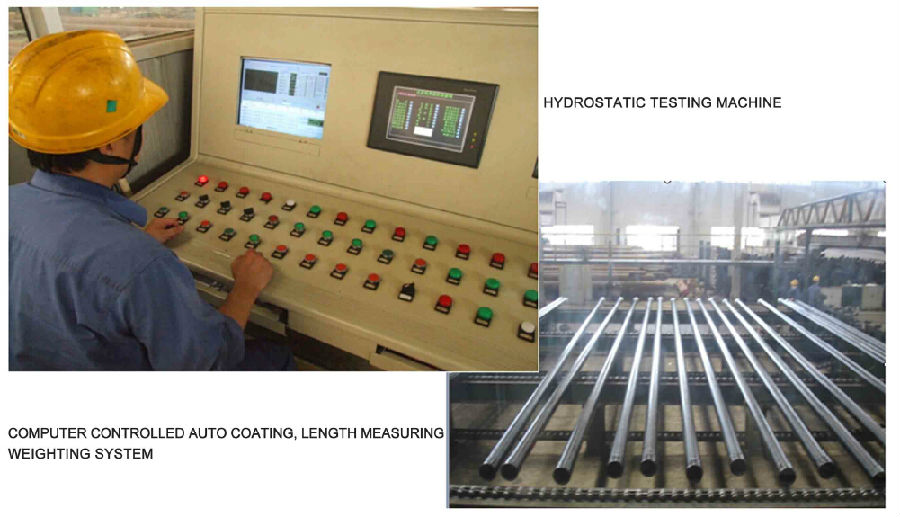
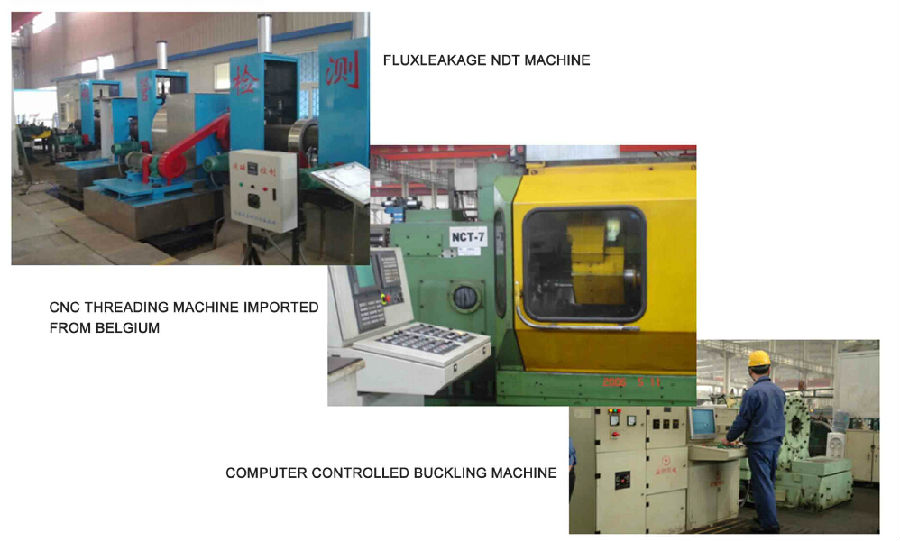
- Q: What are the different types of supports used for aboveground steel pipes?
- There are several types of supports used for aboveground steel pipes, including pipe hangers, pipe clamps, pipe shoes, and pipe saddles. These supports are designed to provide stability and prevent excessive movement or sagging of the pipes. They help distribute the weight of the pipes evenly and ensure proper alignment and support throughout their length.
- Q: Are steel pipes suitable for structural applications?
- Yes, steel pipes are suitable for structural applications due to their high strength, durability, and versatility. They are commonly used in various construction projects such as buildings, bridges, and infrastructure due to their ability to bear heavy loads, resist corrosion, and withstand extreme weather conditions.
- Q: How can two smooth steel pipes be joined? The size of the two pipe is different (except for welding)
- Rectangular fastener: used for the connection of two vertical intersecting steel tubes. It relies on the frictional force between the fastener and the steel tube to carry the load.Swivel fastener: used for connecting two steel tubes intersecting at any angle
- Q: How do you calculate the pressure drop in a steel pipe?
- To calculate the pressure drop in a steel pipe, you need to consider factors such as the pipe diameter, length, flow rate, and fluid properties. The pressure drop can be determined using various formulas, such as the Darcy-Weisbach equation or the Hazen-Williams equation, depending on the specific conditions and assumptions made. These equations take into account factors like pipe roughness, viscosity, and Reynolds number to determine the pressure drop across the pipe.
- Q: How are steel pipes transported?
- Steel pipes are typically transported using various methods, including trucks, trains, and ships. They are often loaded onto flatbed trucks or railcars for land transportation, while larger quantities are transported by bulk carriers or container ships for overseas shipping. The pipes are secured with straps or chains to ensure safe and stable transport, and they may also be packed in bundles or placed in specially designed containers to protect them from damage during transit.
- Q: What are the factors to consider when selecting the right steel pipe for a specific application?
- When selecting the right steel pipe for a specific application, there are several factors that need to be considered. These factors include: 1. Material compatibility: It is important to ensure that the steel pipe is compatible with the material it will be transporting or containing. Different materials may require specific types of steel pipes to avoid corrosion or contamination. 2. Pressure and temperature requirements: The pressure and temperature conditions that the steel pipe will be exposed to must be taken into account. This will determine the required thickness and strength of the pipe to ensure it can withstand the desired operating conditions. 3. Size and dimensions: The size and dimensions of the steel pipe should be chosen based on the flow rate, volume, and space available for installation. It is crucial to select a pipe with the appropriate diameter and wall thickness to prevent any flow restrictions or leakage. 4. Environmental conditions: The environment in which the steel pipe will be installed should be considered. Factors such as exposure to moisture, chemicals, or extreme temperatures may require the use of specific coatings or materials to enhance the pipe's durability and longevity. 5. Cost considerations: The cost of the steel pipe and its installation should be taken into account. It is essential to strike a balance between the desired quality and the available budget to ensure the most cost-effective solution. 6. Regulatory compliance: Depending on the application, there may be specific industry regulations or standards that need to be followed. It is important to choose a steel pipe that meets these requirements to ensure compliance and avoid any legal or safety issues. 7. Maintenance and lifespan: The maintenance requirements and expected lifespan of the steel pipe should also be considered. Some applications may require regular inspections or replacements, while others may require a more durable and long-lasting pipe. By carefully considering these factors, one can select the right steel pipe for a specific application that meets the desired performance, durability, and safety requirements.
- Q: What are the different types of steel pipe coatings?
- There are several types of steel pipe coatings, including epoxy coatings, polyethylene coatings, polyurethane coatings, and zinc coatings. These coatings help protect the steel pipes from corrosion, increase their lifespan, and improve their performance in various environments.
- Q: How are steel pipes joined together?
- Steel pipes are commonly joined together using various welding techniques, such as arc welding, butt welding, or socket welding. Additionally, other methods like threaded connections, flanges, or mechanical couplings can be used for joining steel pipes.
- Q: How are steel pipes used in the transportation of liquids and gases?
- Steel pipes are used in the transportation of liquids and gases due to their durability, strength, and resistance to corrosion. They are commonly used in industries such as oil and gas, water supply, and chemical processing. Steel pipes ensure the safe and efficient movement of fluids over long distances, as they can withstand high pressure and extreme temperatures. Additionally, their seamless construction minimizes the risk of leaks, making them essential for transporting various liquids and gases.
- Q: How are steel pipes used in the manufacturing of pulp and paper mills?
- Steel pipes are used in the manufacturing of pulp and paper mills for various purposes, such as conveying water, steam, and chemicals, as well as transporting pulp and paper materials within the facility. These durable pipes are essential for the efficient and reliable operation of the mills, ensuring a continuous flow of resources and facilitating the production processes.
Send your message to us
A P I 5CT Oil Well Tubing
- Loading Port:
- Tianjin
- Payment Terms:
- TT OR LC
- Min Order Qty:
- -
- Supply Capability:
- 20000ton m.t./month
OKorder Service Pledge
OKorder Financial Service
Similar products
Hot products
Hot Searches
Related keywords
